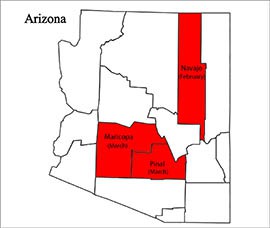Cronkite News has moved to a new home at cronkitenews.azpbs.org. Use this site to search archives from 2011 to May 2015. You can search the new site for current stories.
Princeton meningococcal bacteria seen in three Arizona cases this year
PHOENIX – Arizona has seen three cases this year involving the rare bacteria behind Princeton University’s outbreak of meningococcal disease, a state health official said Tuesday.
The cases occurred in Navajo County in February and Maricopa County and Pinal County in March, said Jessica Rigler, bureau chief of the Arizona Department of Health Services’ Office of Epidemiology and Disease Control.
The cases, among 11 total involving meningococcal disease this year, are a reminder that the much more common strain of meningococcal bacteria can be thwarted by vaccine and that transmission of even the rare strain can be prevented through simple precautions, including not kissing those who are sick or sharing beverages and silverware, Rigler said.
“The best way to prevent your children from getting ill is to get them vaccinated,” she said. “Vaccines can’t cover every illness, but you can get protection for a large portion, including meningococcus.”
The New Jersey Department of Health has declared an outbreak of meningococcal disease at Princeton University, where seven cases have been reported since March. The outbreak involves the serotype B meningococcus bacteria, which is more common abroad than in the United States.
The vaccine given in the U.S. targets different meningococcal bacteria, prompting officials at Princeton to agree to use a vaccine currently offered in Europe and Australia.
Rigler said the three Arizona cases didn’t represent an outbreak and that more detailed information on the cases isn’t public record here.
In 2008, Arizona enacted a law requiring meningococcal immunization for grade school students ages 11 to 12. A booster dose is recommended at age 16 but isn’t mandatory. Rigler said that for the 2012-2013 school year, 95 percent of Arizona’s 10th-graders were immunized.
Meningococcal infection is transmitted by lung, throat and mouth secretions, making those who live in close proximity in college dorms or military barracks susceptible. For college students, the Centers for Disease Control and Prevention recommends initial vaccination for freshmen or a booster dose if the last meningococcal vaccination was five years prior to college entry.
Connecticut, New Jersey, Texas and Vermont require certain college students living in dorms to receive the vaccine, according to the National Conference of State Legislatures. But meningococcal vaccination isn’t mandatory for enrollment at Arizona’s public universities.
Dr. Allan Markus, director of ASU Health Services at Arizona State University, said that all new ASU students who move into dorms receive packets that include information about meningococcal disease and the vaccination. Students must sign a tracking form noting that they either have had the vaccine or choose not to get the vaccine before moving in.
“This allows students to make an informed choice about getting that vaccination before they live in the close quarters in dorms,” Markus said.
The University of Arizona has no set policy for pre-enrollment meningococcal vaccination, according to Terri West, administrative associate for UA’s Campus Health Service. She said the university provides all new students with information focused on prevention, including a postcard with links to the university’s websites.
“We also reach out to the freshmen at orientation to again tell them the importance of vaccination, especially for those students in dorms or Greek houses,” West said.
Graham Briggs, Pinal County Health Department’s administrator for infectious disease and epidemiology, said that while meningococcus is rare, county health departments in Arizona have a 24-hour reporting system for serious infectious diseases.
“Over the years when this has happened, we jump into action day or night to begin prevention measures for anyone who has possibly been exposed,” Briggs said. “But the best prevention is still vaccination before the disease hits.”
If the meningococcus bacteria gets into the bloodstream, some patients can die before treatment begins because the disease sometimes progresses rapidly after the first mild symptoms of fever, headache and not feeling well.
According to the CDC, one in 10 people who get the the invasive disease will die and one or two of every 10 survivors can have serious complications such as losing a leg or arm, going deaf or suffering severe brain damage.
Kacey Ernst, an infectious disease epidemiologist with the University of Arizona’s College of Public Health, said events in New Jersey could lead to more people getting vaccinated.
“This is certainly a good time to raise awareness and use the Princeton example to start more discussions in Arizona about this disease and vaccination recommendations,” she said.









